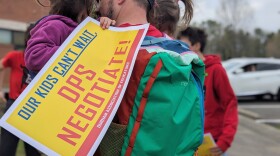The Pauli Murray Center for History and Social Justice is among the latest organizations in North Carolina to lose funding from the federal government.
The center learned last week that a federal, multi-year grant of $330,800 from the Institute for Museum and Library Services Museum was terminated.
The termination notice said the grant "no longer serves the interest of the United States and the IMLS Program,” in alignment with Executive Order 14238 from President Donald Trump to reduce federal spending, according to the Pauli Murray Center.
"Pauli Murray saw so much promise in America that they dedicated their life to envisioning and shaping an America, where all people, regardless of race, class, gender, sexuality, could live without oppression," the center's Executive Director Angela Thorpe Mason said. "I think that's one of the most American things anybody could do."
The grant was previously awarded to the organization in 2024 for museums and libraries uplifting African American history and culture.
Losing the funding represents an "insurmountable" amount in terms of the center's work and finances, which consists of five full-time staff, Mason said.
"It has a major impact on both our work and our financial realities," Mason told ��������վ. "We're not a large organization."
The grant consisted of nearly 20% of the current fiscal year's budget, and would consist of nearly a quarter of next year's budget, she said.
"We looked forward to installing a new exhibition in Pauli Murray's home, that centered Pauli's humanity, community and spirituality that would have drawn visitors from near and far," said Mason. "That exhibit is no longer feasible."
The center also funded a part-time position and special educational programming with the grant. It also included $170,000 for the creation and installment of the new exhibition at the center, which is located in their historic childhood home on 906 Carroll St. in the West End neighborhood and is .
The money was also slated to fund the following: a history curriculum for eighth graders, an intern for the academic year, research travel for its public historian, and compensation for a range of local community members for their contributions to the center's programs.
“Our assignments are clear, and our work continues,” Jesse Huddleston, chair of the center's board, said in a statement. “We have overcome much and have come so far, not just by faith but also by the cooperative actions of countless people, rooted in a shared understanding that the legacy of Pauli Murray must be preserved and amplified, despite every oppressive attempt to render it invisible."
The center's leadership says its another attempt from the Trump administration to censor its work.
Earlier this year, the federal government removed online references to Murray's queer and transgender identity on the federal U.S. National Park Service website — a move the Pauli Murray Center condemned.
Murray is considered by scholars to have identified as transgender and is identified posthumously with "they/them" pronouns.
Internet archives show that the was edited last month to remove the words "queer" and "transgender," ��������վ reported previously.
Murray's and its link returns an error message.
Text about the historic home's restoration at the bottom of the page previously included "Murray's contributions to twentieth-century civil, women's and LGBTQ+ rights history." The text was edited subtly to reflect "civil, women's and LGB rights history" instead.
Other references on the site with the LGBTQ acronym were edited to just "LGB" on other webpages.







